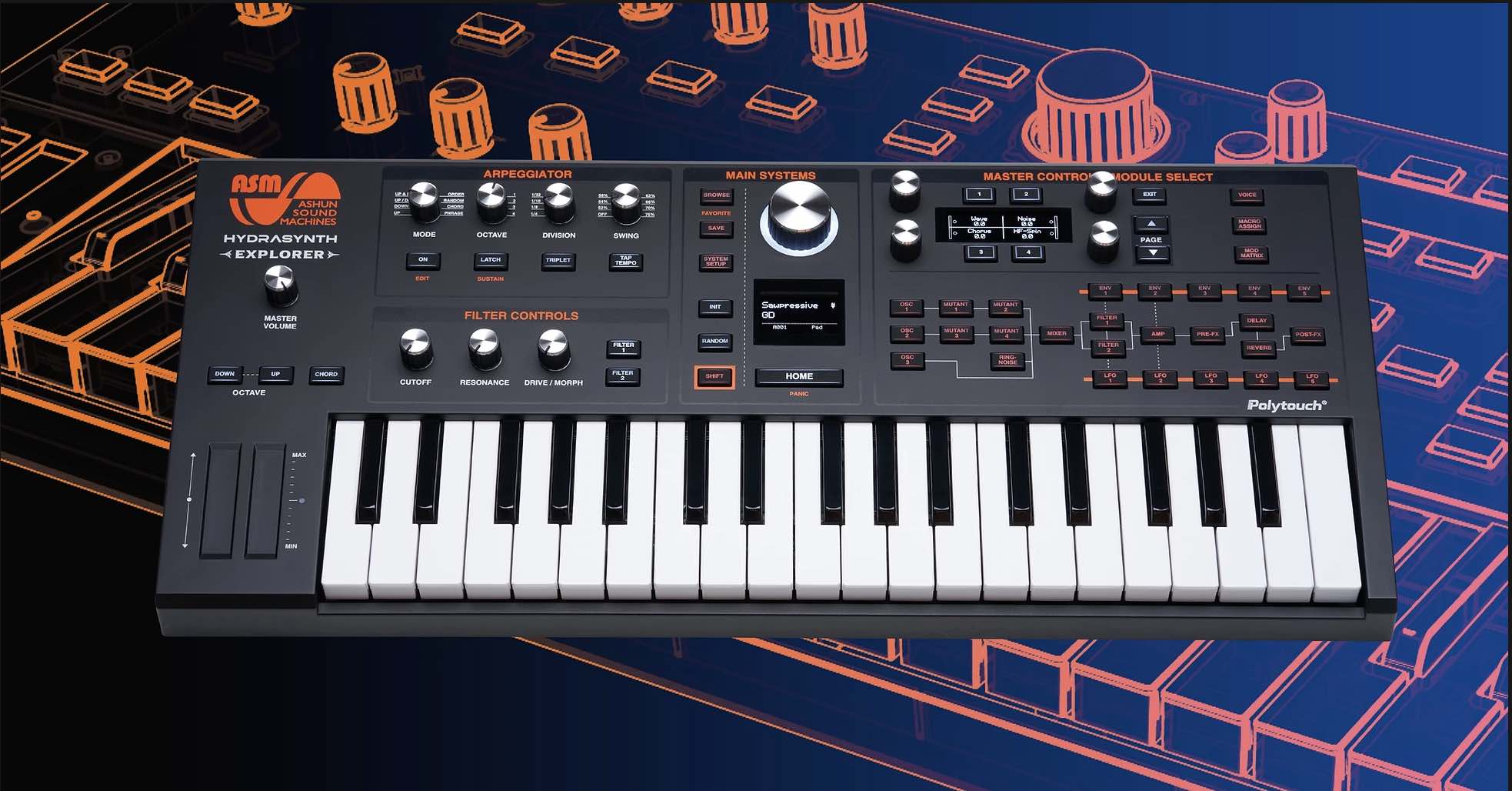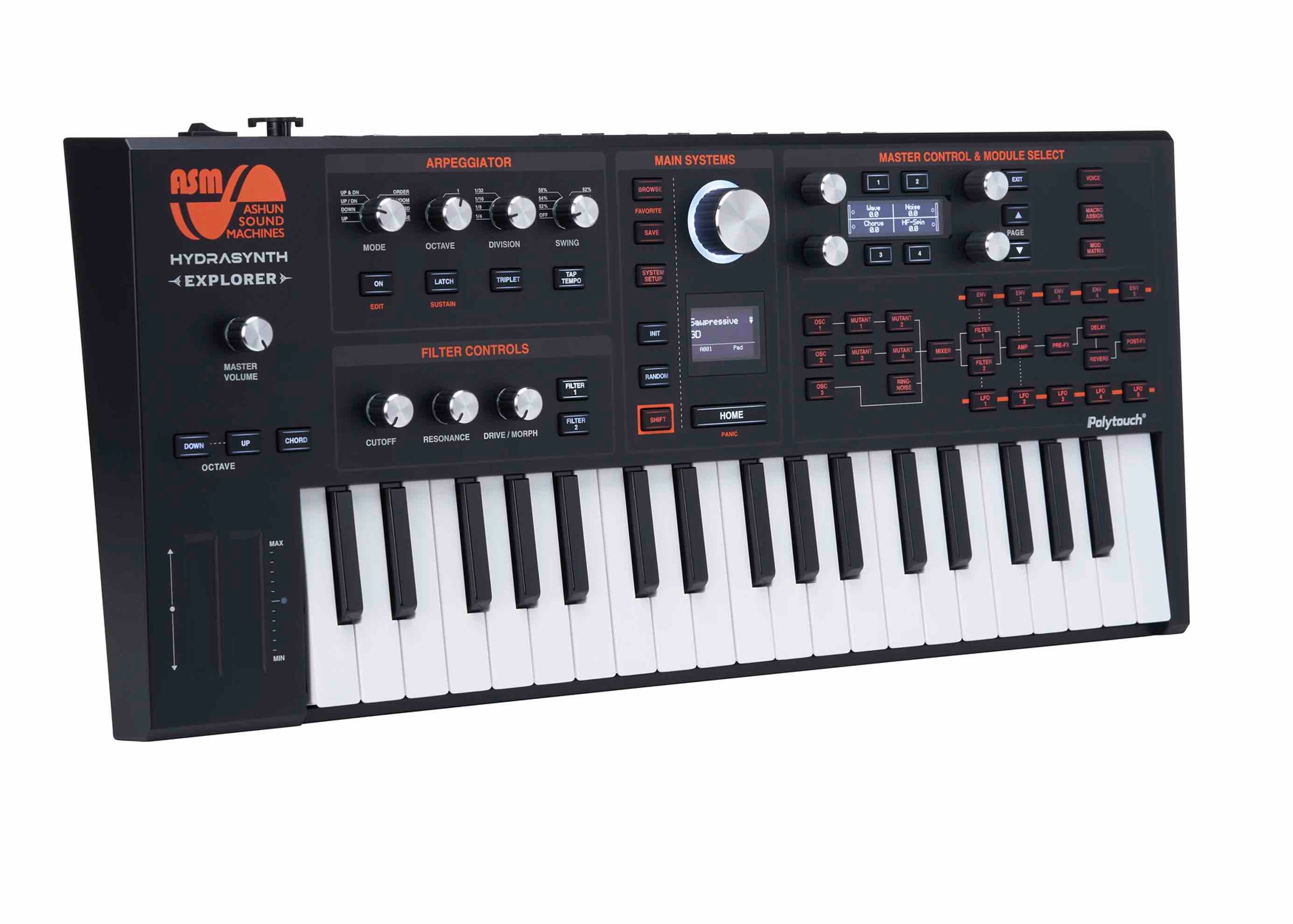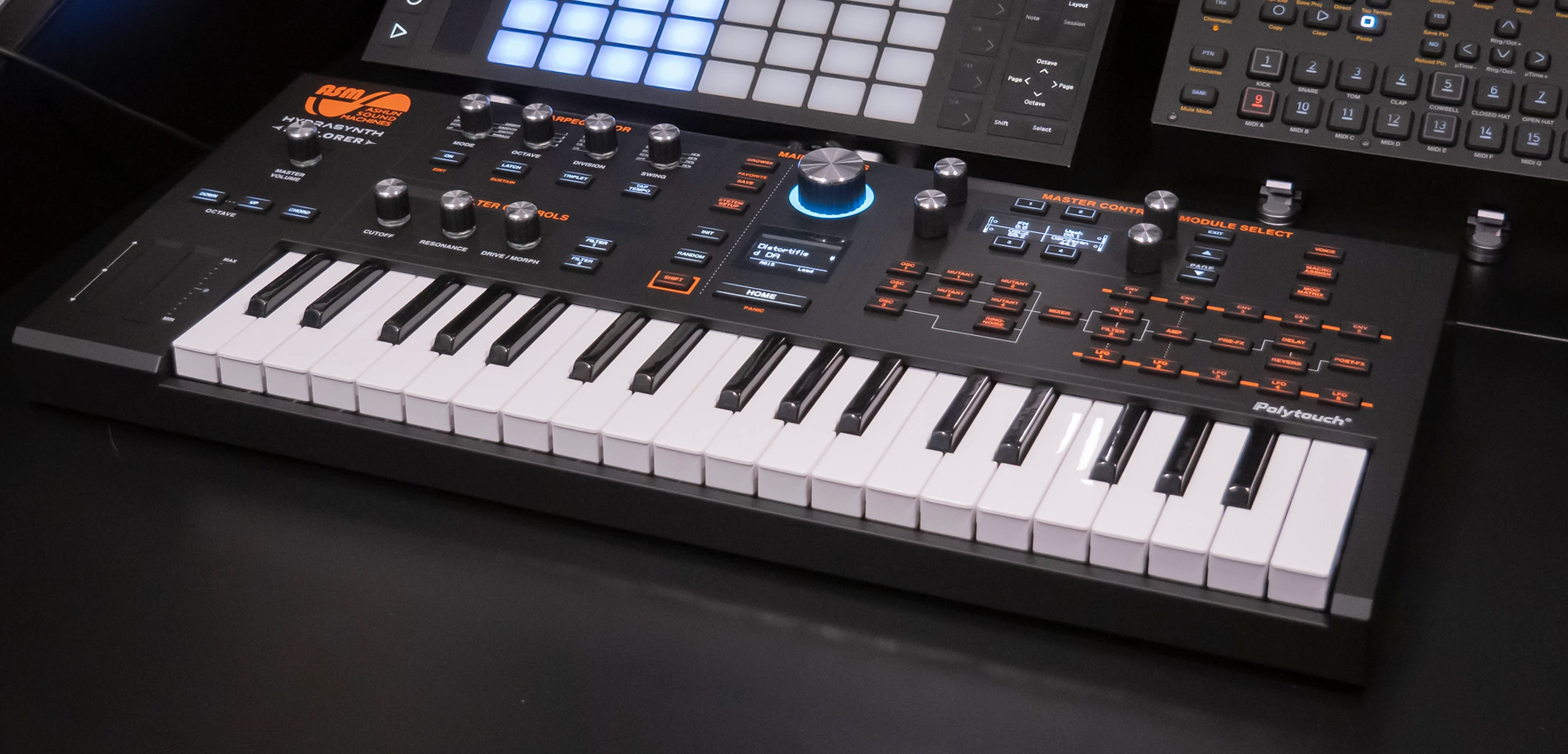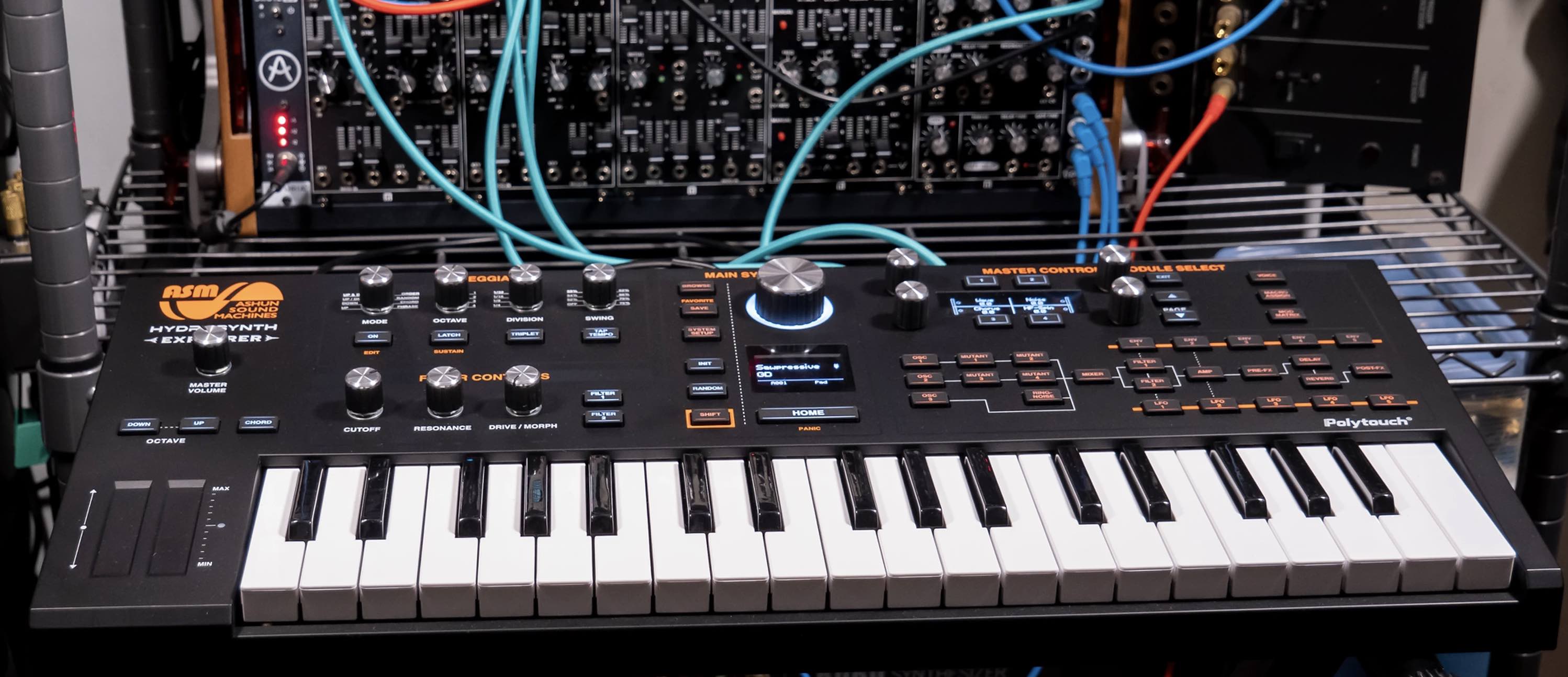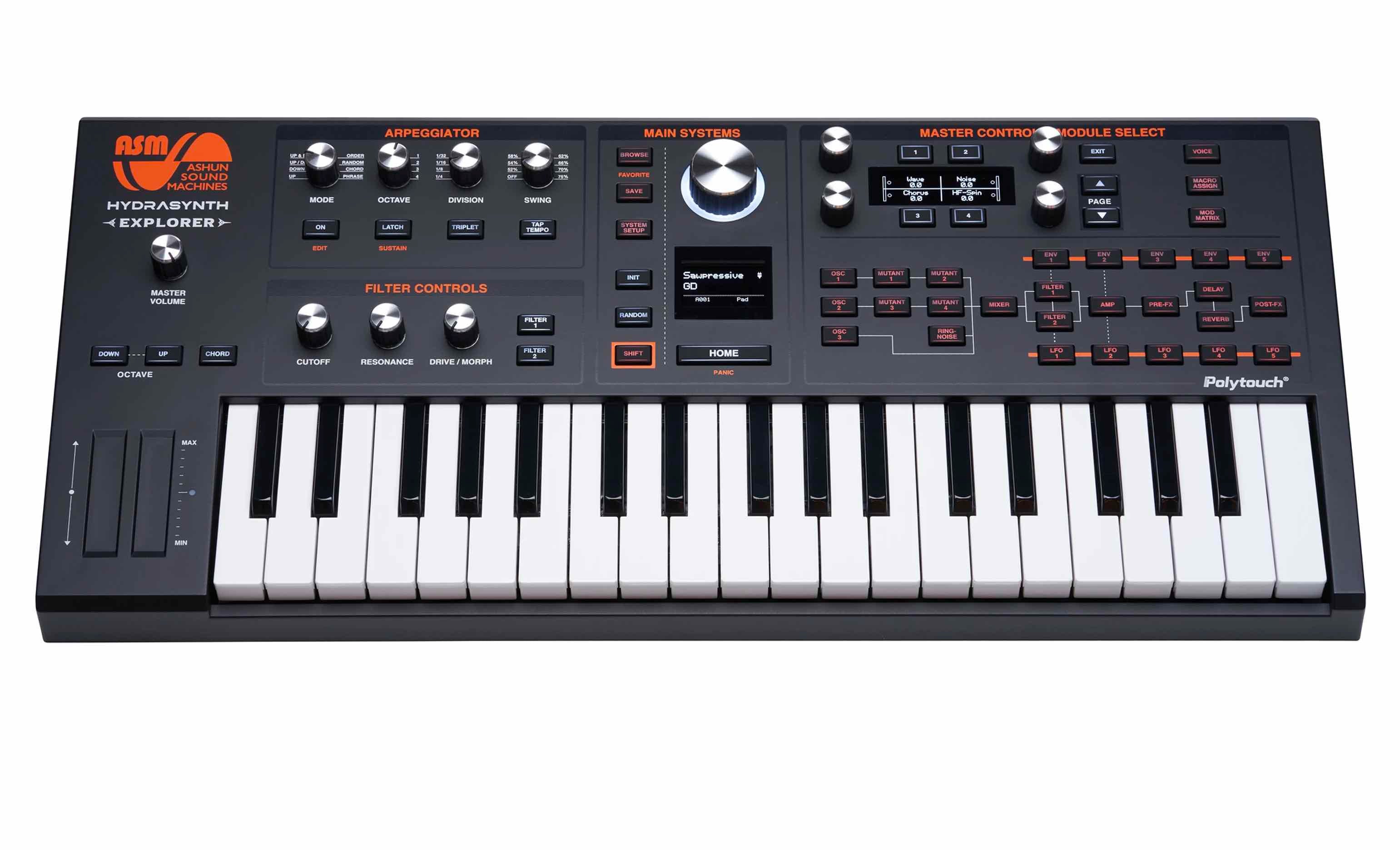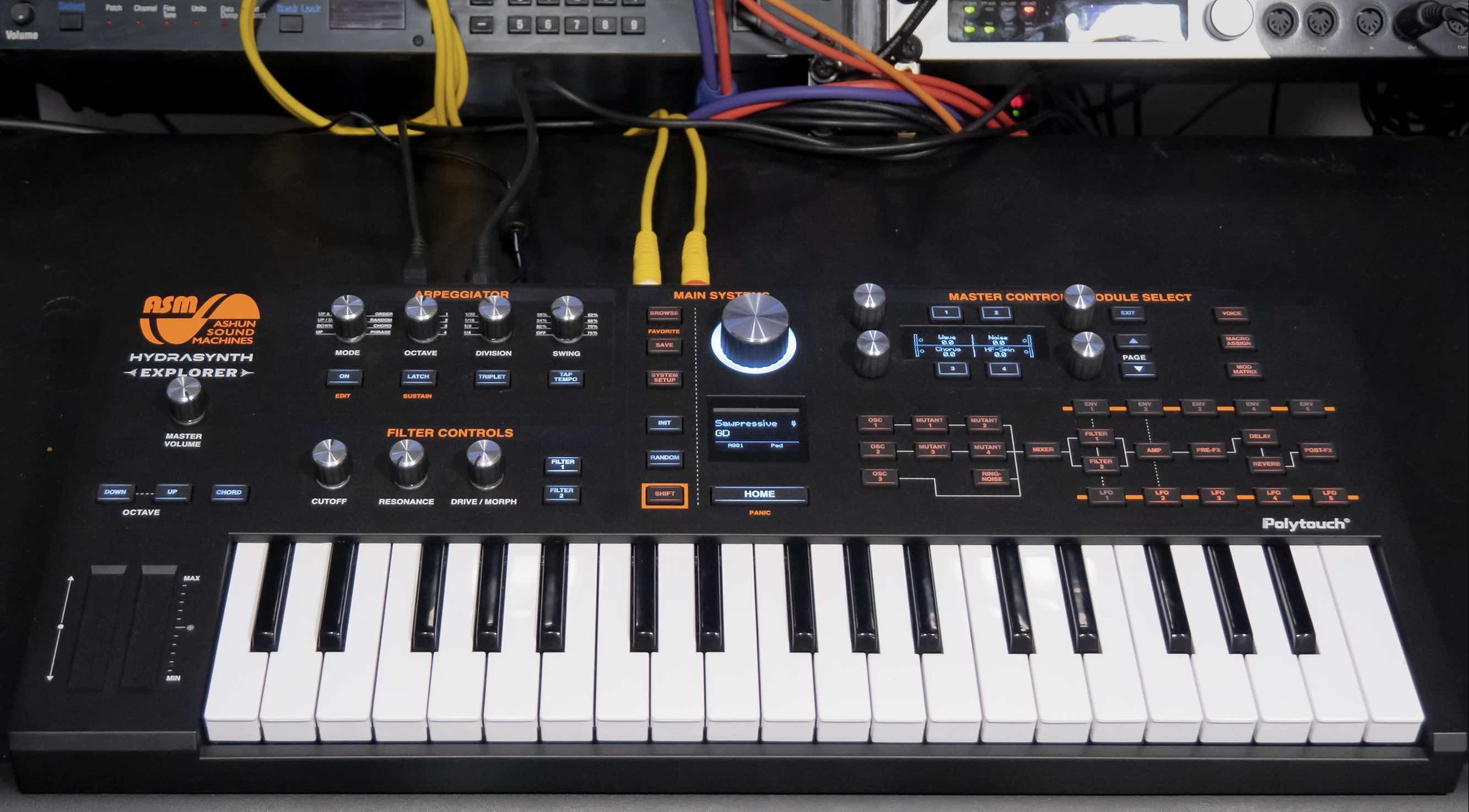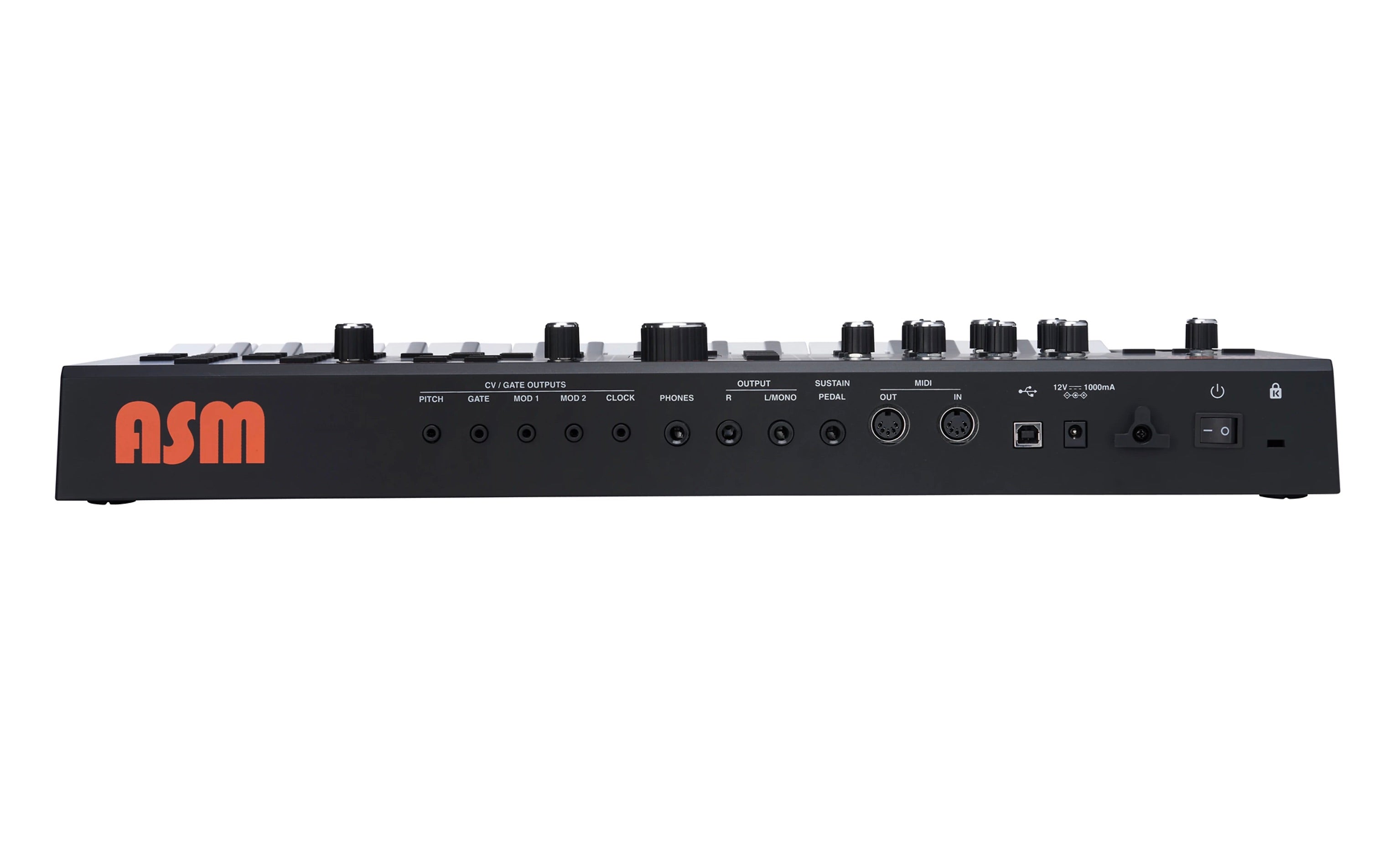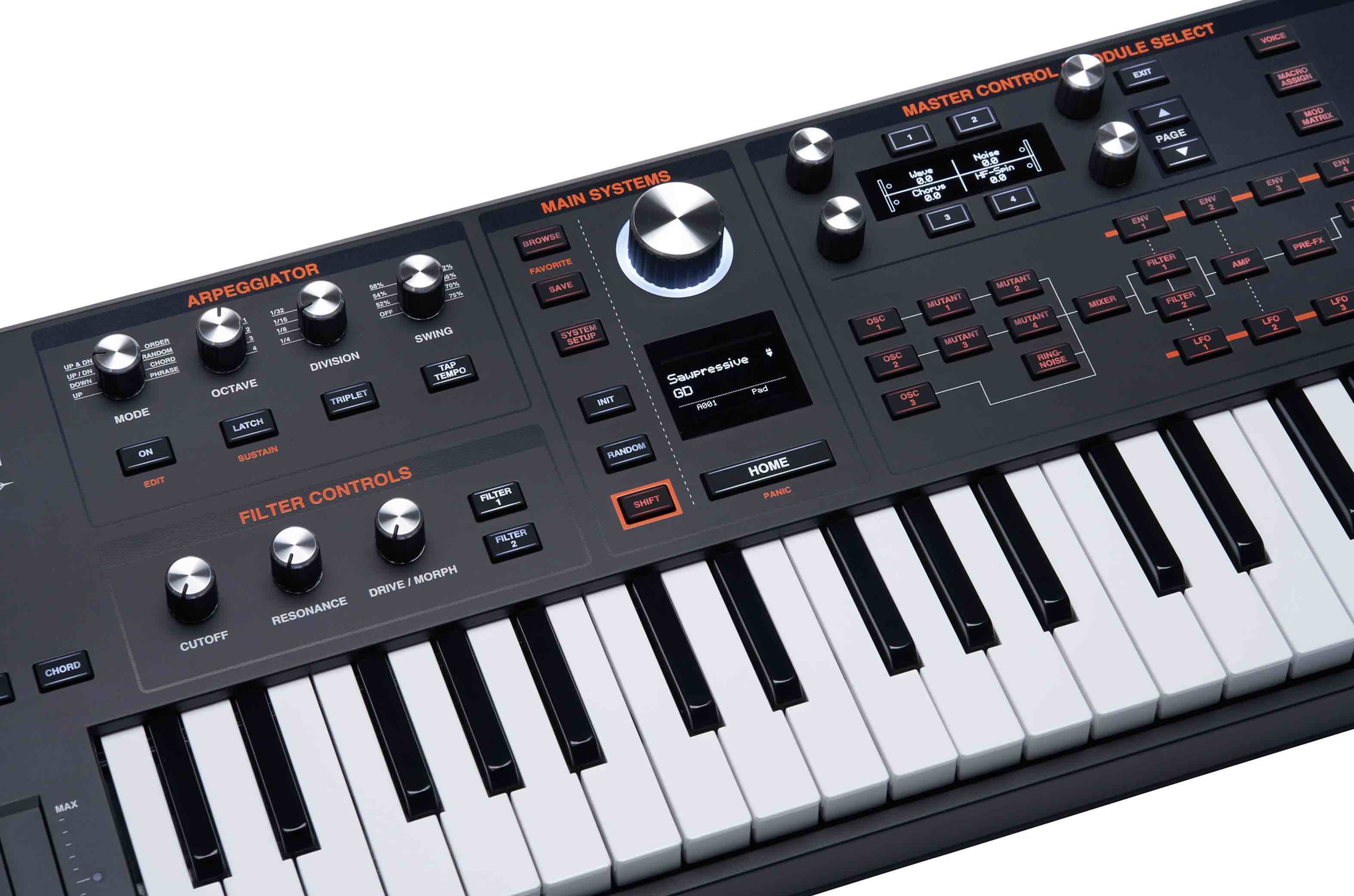The HYDRASYNTH EXPLORER is the ultimate in power and portability, combining the powerful Hydrasynth sound engine with battery-powered operation and our new, mid-sized Polytouch® polyphonic aftertouch keybed. The user interface is designed with the utmost attention to detail, making sound creation a breeze. This is the ultimate, portable companion for any setup, and anywhere else a smaller footprint is needed.
With an advanced wavetable synthesis engine, 3 Oscillators, dual Wave Mutants, and 2 filters that can be configured in series or parallel, the tone generating capabilities are unmatched.
As for the performance capabilities, the Hydrasynth Explorer has our proprietary 37-note mid-sized Polytouch® keybed with polyphonic aftertouch. This provides a level of expressive, per-note control found only in certain vintage synths.

Polytouch® Keybed
The perennial pursuit of musical instrument manufacturers is to find better ways for musicians to express themselves. Options have been limited for keyboard players; we've had to settle for a velocity-only approach to emphasize one note over another. Pressure-sensitive keyboards could only change all of the notes at the same time.
Enter ASM, with our patented Polytouch® technology. The semi-weighted keybed on the Hydrasynth Explorer provides fully polyphonic aftertouch, as well as Note On / Note Off velocity sensitivity and the monophonic aftertouch found on other keybeds. Finally, variations in key pressure can affect notes individually. It feels great, too: the 37-note Polytouch® keybed on the Explorer features high quality, mid-sized keys, and you will feel right at home, right away.
The revolutionary Hydrasynth Explorer Polytouch® keyboard helps you be more in touch with the music you are making. Now every note you play can ebb and flow like the tide.
Battery-powered operation
The Hydrasynth Explorer is highly portable! In addition to its compact size, it can be powered by 8 AA batteries for hours of music-making anywhere you want to go.
Oscillators
The tone generation capability is the heart of any synthesizer, and the 3 Hydrasynth oscillators are alive with potential.
Each of the oscillators lets you choose from a selection of 219 single-cycle waveforms. And on top of that, two of the oscillators have powerful wavemorphing capabilities.
Wavemorphing is a feature usually found on synths with preset wavetables. But creating user wavetables on those products is arduous or downright impossible. Unlike most wavetable synths, our oscillators 1 & 2 have our easy-to-use WAVELIST mode.
This mode lets you select any 8 waves from our diverse collection of 219 waves, arrange them in the order you want, and then morph from one wave to another. This can be done automatically with any modulation source, such as an LFO or an envelope, or manually with a physical control such as polyphonic aftertouch or a Macro.
And now in version 2.0 you can choose the bit depth of each oscillator, which puts those sought-after vintage or grungy sounds at your fingertips.
Mutants
Oscillators 1 & 2 are routed into our MUTANTS. The Mutants allow you to modulate, bend and sculpt the sound in new (and old) ways.
Each Mutant lets you choose from the following processes:
- FM-Linear: This is for making classic FM sounds. Choose multiple FM sources, including external inputs.
- WavStack™: Creates 5 copies of the input source and allows you to set a detune amount.
- Osc Sync: This gives you those classic hard sync sounds. Try hard-syncing a morphing wavetable for some fun.
- Pulse Width Modulation (PW-Orig): Performs the classic pulse width modulation on any waveform.
- PW-Squeeze: Compresses the center section of the waveform, for a unique type of PWM.
- PW-ASM: Divides the incoming wave into 8 slices and lets you set the amount of FM that is applied to each segment. This is FM unleashed.
- Harmonic Sweep: This will sweep the harmonics of the input source.
- PhazDiff: Generates the difference of the incoming wave and a version that is inverted and phase-shifted.
The Mutants can also generate their own waveforms in both FM and Sync modes so you don't have use another oscillator. Of course the routing is flexible so you can choose the other oscillators as mod sources if you like.
Mixer / Filter Routing
The 3 Oscillators are fed into a mixer along with the Noise generator and Ring Modulator. The mixer gives you independent control over the levels and stereo positions of those 5 sources. After this you are able to choose how much signal from each source is routed to filters 1 and 2. The filters can be routed in parallel or series for ultimate flexibility. Who knew that a simple mixer could be so powerful? Well, in all humility, we did.
Filters
If oscillators and tone generators are the heart of a synthesizer, the filters are the soul. The soul of a Hydrasynth is a complex thing; it can claw or caress, scream or soothe, mangle or melt. It has been known to speak. The multi-faceted Hydrasynth filters are right in the thick of it. Filter 1 has 16 different models ranging from 1 to 8 poles, many with high-, band-, and low pass options. There is also a flexible vocal filter with formant control. Even if Filter 1 were the only filter the Hydrasynth had, it would take a lifetime to exhaust the possibilities.
Filter 2 is a 12dB per octave state-variable filter, which means it can sweep continuously from either low pass > bandpass > high pass or low pass > notch > high pass. It is similar to the classic SEM filter in many ways. These two formidable filters can be configured in series or parallel. This means the one can feed and be sculpted by the other (series), or they can complement one another (parallel). With careful use of source panning in the Mixer module, the left and right outputs can be completely different or rich in unified complexity.
LFO's
5 Low-Frequency Oscillators…YES, FIVE.
Much like our sound engine, the LFOs are not ordinary by any means.
The Hydrasynth LFOs feature a STEP mode that lets you create patterns with up to 64 steps. Having 5 mini step sequencers gives you an amazing number of possibilities for further shaping your sound.
Of course, there are also 10 standard waveforms available, including Sample and Hold, Noise, and Random.
Each LFO has delay, fade in, 3 triggering modes, smoothing, start phase, BPM sync, and a One-Shot mode so that they can act as envelopes. The version 2.0 LFOs have some exciting new features, including a Step option for the One-Shot mode that allows the Step wave to advance by one step per trigger.
And LFOs now can be quantized to create stepped values. It's like bit reduction for your LFOs.
Wait...LFOs can be envelopes?! Can envelopes be LFOs? We're glad you asked...
Envelopes
5 DAHDSR Envelopes…YES, FIVE.
An advanced sound engine needs plenty of modulation sources. Our 6-stage envelopes feature Delay, Attack, Hold, Decay, Sustain, and Release stages.
The durations of the ADR stages can be set to seconds or subdivisions of the tempo, giving you envelopes that play in sync to your song.
In fact, you can also loop the envelopes, which turns them into LFOs that can be shaped by any source in the modulation matrix.
Each envelope can be triggered by up to four different sources, and there's a Tap Trigger option too. And now the envelopes can be quantized to different step levels as of version 2.0. Bit reduction strikes again!
Modulation Matrix
The modulation capabilities on the Hydrasynth are endless.
With 32 user-definable Modulation matrix slots, there are plenty of ways to use the 35 modulation sources and 191 modulation destinations.
Almost everything in the synth engine can be a modulation destination, including the effects and arpeggiator.
The modulation routes themselves can also become modulation destinations, and can be targeted by the Macros too.
Modulation sources & destinations include the CV Mod Out jacks as well as all 128 MIDI CCs.
We should mention that there are some hard-wired modulation routes located in other modules too. This means you don't have to burn up one of the 32 mod routes in the Modulation matrix to do certain basic functions.
It's rare that someone actually uses all 32 mod routes in a patch anyway, but hey, we're feeling generous.
Arpeggiator
The arpeggiator has all the standard arpeggio directions plus a few twists (up, down, and/or sideways, sort of). There's also a built-in phrase mode, and version 2.0 adds new features like Step Offset and increases the range to 6 octaves. Parameters like RATCHET and CHANCE will generate other semi-random rhythmic patterns to add life and spontaneity to your performance. You can also modulate most of the parameters in the arpeggiator. Imagine using LFOs, Envelopes, Polyphonic Aftertouch or the Ribbon controller to modify your arpeggios in real time! It boggles the mind.
CV / Gate - MIDI - USB
Industry-standard MIDI and USB/MIDI interfaces are available on the Hydrasynth, but we go deeper and allow the use of CV / Gate interfaces for connecting to the modular world. This opens a door to the unlimited expansion of your musical horizons. Our CV / Gate / Mod connectors support the standard voltages for Eurorack modulars, the 1.2V per octave Buchla standard, as well as some of the Japanese Volts > HZ products. The CV Mod Out jacks allow for modulation that reaches into the audio range, which multiplies your modulation capabilities.
Main Controls
The Main System controls are where you navigate the patch banks, configure system settings, and can view parameters like the envelopes, waveforms, and filters in the OLED screen. The INIT and RANDOM buttons make it possible to initialize or randomize a complete patch, a specific module, or an individual parameter with a simple press & hold button combination. There's even an option that randomly selects features from other patches to make a new patch. The results are surprisingly good! It has never been easier to find new inspiration. A single press of the HOME button always takes you back to the Home page, where you can continue to browse the amazing Hydrasynth patches.
Master Controls
The Master Control section is where all parameter editing, patch naming, and Macro performing is done. It sounds simple, and it is. We always make sure of that. Using OLED screens, 4 high-resolution encoders, 4 buttons, and 2 pages, this section is designed to give you good feedback on what is happening inside the patch and during a performance. The VOICE parameters give you access to polyphony modes, analog feel, voice panning and many other features, including the new per-voice modulation capabilities that arrived in version 2.0. Now there's a Glissando option for the Glide feature, too.
Macros
The Macros are designed to allow deep control over the engine in live performance. They're easy to make and fun to use. The Explorer has two Macro pages, each with 4 assignable pairs of encoders and buttons that can be routed to as many as 8 destinations, including effects parameters and modulation routes. Complete sound transformations can take place with the press of a button or the turn of a knob. You can save the results as a new patch, too.
Patches
Patch memory has increased in v2.0! The Hydrasynth Explorer now holds 8 banks of 128 patches, for a total of 1,024. We hired some of the best sound designers in the world to create the factory patches. Finding the patch you want and searching the library is made easy with our Browser. Three patch sorting methods make it even faster. The Favorites browser lets you select 32 patches from any bank for immediate access. Our Patch Manager application for Windows and macOS also helps you move and organize patches easily, so you can create your favorite order as well as load in new patch libraries in the future.
Effects
The Hydrasynth Explorer's effects chain goes beyond the typical ones found in other synths. Pre-effects and post-effects give you some unique ways to process your sound, including pitch effects, Lo-Fi, EQ, and Distortion. The delays and reverbs were modeled after some of the most popular effects on the market. They're smooth, silky, and perfectly synced. These high-quality effects are the perfect way to complete your sound, in the box. You're always ready to create the perfect mood with a Hydrasynth Explorer.
Details Specs
Physical Specifications
-
Metal Chassis
- Sturdy plastic and metal construction
- High quality rubberized buttons on the panel
-
Polytouch® Keybed
- 37 mid-sized keys, semi-weighted
- Polyphonic aftertouch
- Note On & Note Off Velocity
- Selectable velocity / aftertouch curves
-
Additional Hardware Controls
- Octave Up/Down buttons for instant transposition
- Chord mode button: stack up to 8 notes in a chord
- Pitch bend / modulation strips with adjustable depth
-
Patch Memory
- 8 banks with 128 patches each: 1,024 total
- Sort patches by Patch number, Name, or Category
- Browse Favorites: Select 32 patches from any bank for immediate access
-
CV / Gate outputs
Supports multiple CV / Gate standards
-
CV
- 1v per octave 0-5V
- 1v per octave +/-5V
- Hz to Volts 0-5V
- 1.2V per octave
- Adjustable offset: +/-99 cents
- Adjustable reference note: C-1 to G9
-
Gate
- V-trig, S-trig
- 3V, 5V
-
Mod Out range
- +/-5V, 0-5V, 0-1V
- Adjustable offset: +/-3V
-
Clock Out
- 1PPS, 2PPQ, 24PPQ, 48 PPQ
- Clock Voltage: 3v, 5V
- Selectable clock division: Off, 1/2, 2, 4
- Adjustable offset: +/- 100ms
-
-
MIDI IN / OUT
- Voice overflow mode to expand polyphony with a second Hydrasynth
-
Sustain pedal input
- Polarity sensing
- Three modes of operation: Sustain, Sostenuto, and Modulation Only
-
DC input jack
-
Battery compartment
- Holds 8 AA batteries for hours of portable operation
-
USB port
- Supports USB MIDI In/Out
-
Dimensions
- 55.6 x 25.5 x 7.8 cm (21.9" x 10" x 3.1" inches)
-
Weight
- 3.4 kg (7.5 lbs)
Sound Patch Specifications
8 Voice Advanced Wavetable synthesis
-
Oscillators 1 and 2: Wavemorphing oscillators
- 219 single-cycle waveforms
-
User wavetables
- 8 user-selectable waves per oscillator to build custom wavetables
- WaveScan parameter lets you morph through the wavetables
- Every patch can have two unique wavetables
- Bit reduction: 11 settings from 2 to 16 bits, and Off
- +/- 3 octave tuning range
- Keytracking: 0-200%
-
Oscillator 3: fixed Wave oscillator
- 219 single-cycle waveforms
- Bit reduction: 11 settings from 2 to 16 bits, and Off
- +/- 3 octave tuning range
- Keytracking: 0-200%
-
Dual Mutants per oscillator (Osc 1 and 2)
- FM: Linear FM
-
Selectable Modulator source:
- Internal Sine & Triangle waves, Oscillators 1-3, Ring Mod, Noise generator, Mutants 1-4
-
- WavStack": Generates 5 detuned waves from the input source, with adjustable detune amount
- Hard Sync (Osc Sync): gives that classic sync sweep sound
- Selectable sync input source: Oscillators 1-3
- Adjustable Hann window to shape the output
- Pulse Width Modulation (PW-Orig): Adjusts the pulse width of any waveform
- PW-Squeeze: Compresses the center section of the waveform, for a unique type of PWM
- PW-ASM: 8 adjustable Warp points can be applied to the waveform, for a unique form of FM synthesis
- Warp points can be modulated individually through the Mod Matrix
- Harmonic Sweep: scans through the harmonics of the incoming waveform
- PhazDiff: creates a new sound by combining phase shifting and summing techniques
- FM: Linear FM
-
Depth control for all Mutants
- FeedBack control for all Mutants (except WavStack): 0-150%
- Ratio control for Osc Sync, Harmonic, and all PWM Mutants: 0.250:1 - 64:1
- Mutations occur up to 64 times in one waveform cycle, or as few as once in four cycles
- Dry/Wet mix to blend the input source with the Mutant output
-
Noise Generator
- White, Pink, Brown, Red, Blue, Violet, Grey noise sources
-
Ring Modulator
- Selectable input source:
- Oscillators 1-3, Noise, Mutants 1-4
- Depth control
- Selectable input source:
-
Sound source mixer
- Independent level control for Oscillators 1-3, Noise, and Ring Mod
- Panning for each source
- Filter routing mix
- Each source can be soloed
- Solo status is saved with the patch
-
Two Filters
- Series or parallel routing
- Filter 1
- 12 & 24dB/octave modern ladder (compensated)
- 12 & 24dB/octave vintage ladder (uncompensated)
- 3-Ler LP, BP, HP
- MS20 HP, LP
- Low Pass Gate
- STN LP, BP, HP
- 1 pole LP
- 8 pole LP
- Vocal filter
- Multiple vowel order options
- Formant parameter
- Filter 2 (SEM style)
- Continuously Variable Low pass > Band pass > High pass
- Continuously Variable Low pass > Notch > High pass
-
Patch-level parameters
- Poly, Mono, and Unison modes
- Two glide modes: Glide and Glissando
- 60 scales available, including microtonal
- New scales can be imported from third-party software
- VoiceMod: independent modulation levels available per voice, per patch
- MPE support
- NRPN / CC automation capability
- Randomize or initialize parameters, modules, or an entire patch
Modulation Specifications
-
5x Low Frequency Oscillators
- 10 static waves
- Sine, Triangle, Saw up, Saw down, Square, Pulse 27%, Pulse 13%, S&H, Noise, Random
- Step Wave: up to 64 user-definable steps (similar to a step sequencer)
- SemiLock for chromatic pitch sequencing
- Can advance one step per trigger
- Clock sync
- Variable rate
- BPM Sync Off: 0.02 - 150 Hz
- BPM Sync On: 1/64T - 64' (16 bars), including dotted and triplet options
- Starting phase
- Start delay
- Fade in
- Master LFO output gain
- Trigger modes: Mono, Poly, Off (free run)
- One shot modes: Off, On, and Step
- Adjustable smoothing of waves and LFO steps
- LFO quantize: 8 levels
- 10 static waves
-
5x Envelope Generators
- 6 stage DAHDSR envelopes
- Delay, Attack, Hold, Decay, Sustain, Release
- Slope curves for ADR stages
- Variable from full exponential to full logarithmic
- Use Tempo or Time option for setting the length of each stage
- BPM Sync option
- Looping of AHD stages
- Loop 2-50 times or indefinitely
- Envelopes can function as additional LFOs
- Envelope quantize: 8 levels
- Trigger modes: Reset, Retrigger, Legato (not available in Poly mode)
- Trigger Sources: up to 4 trigger sources available for each envelope
- 6 stage DAHDSR envelopes
-
Matrix modulation
- 32 slots for source-destination mod routings with amount
- 35 sources, 191 destinations
- Modulation slots can be mod destinations and/or Macro destinations
- Per-voice Modulation sources: bipolar or unipolar
-
4x Macro knobs and buttons
- 8 Macros total (2 pages, 4 Macros each)
- Each Macro knob allows positive and negative control of up to 8 destinations
- Macros can be modulation destinations
-
Arpeggiator
- Arp parameters can be modulation destinations
- Modes
- Up, down, up/down, up & down, note order, random, chord, phrase
- 64 preset phrases
- Adjustable length
- Step offset +/- 32 steps
- Tap Trigger option: advance arpeggiator with Tap Tempo button
- Octave
- Range: 1-6 octaves
- Play order
- Up, down, up/down, alt 1, alt 2
- Swing: Adjustable from 50-75%
- Gate time: 5-100%
- Ratchet: repeats notes
- Chance: sets how often the ratchet takes place
Effects Specifications
-
Pre-effects: before Delay and Reverb
- Chorus, Flanger, Rotary, Phaser, Lo-Fi, Tremolo, EQ, Compressor (with side chain), Distortion
-
Delay
- Mono, Stereo, Panning, LRC (left/right/center), Reverse
- BPM sync option
-
Reverb
- Hall, Room, Plate, Cloud
- Freeze mode
-
Post-effects: after Delay and Reverb
- Chorus, Flanger, Rotary, Phaser, Lo-Fi, Tremolo, EQ, Compressor (with side chain), Distortion

